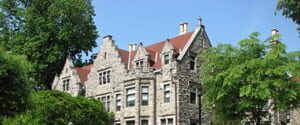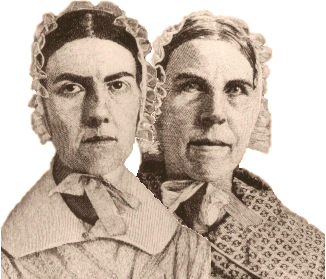In Women’s History Month, it is time to celebrate the contributions of some courageous individuals.
Philadephia Inquirer March 15, 2010
For the first time in history, women make up more than half the American workforce. They already constitute almost 60 percent of college students and a solid majority of degree-earners in the last couple of decades. Yet in most high school history courses, women remain woefully underrepresented.
Some claim this simply reflects reality: Women played a less visible role in past generations, they say — a regrettable result of their oppression by a male-dominated society — but what can be done about it now?
Plenty. In our relatively short history as a country, we have left an enormous paper trail. If our social studies curricula consisted of nothing but women’s history, we would hardly make a dent in the available material.
This happens to be Women’s History Month and the 30th anniversary of the National Women’s History Project, whose theme this year is “Writing Women Back Into History.” Three women with Philadelphia ties deserve to be among those remembered. They fought for the abolition of slavery, for women’s rights, and for the right to an education regardless of color or gender.
Sarah Grimké arrived in Philadelphia in the company of her seriously ill father, a wealthy South Carolina slave owner, in 1820. They came to seek medical treatment for him, but Sarah also had another agenda: to make contact with the city’s abolitionist community.
John Grimké died several months later. Sarah returned to South Carolina, but she soon decided she could no longer live in a home and society built on slave labor. She returned to Philadelphia and became a Quaker and an abolitionist, leaving relatives, friends, and wealth to devote herself to ending the system that created her family’s fortune. One can only imagine the courage and conviction this must have demanded of a young, unmarried woman in the early 19th century.
In 1829, Sarah Grimké’s younger sister, Angelina, joined her. The two went on to become the first women to publicly campaign for abolition, and they faced resistance even from some who supported their antislavery views. Traditional notions of a woman’s role did not include such things as social activism.
But to the Grimkés, abolition and women’s rights were inseparable. They argued that access to education and the ballot must be universal.
“In most families,” Sarah wrote in 1837, “it is considered a matter of far more consequence to call a girl off from making a pie, or a pudding, than to interrupt her whilst engaged in her studies. This … teaches women to regard themselves as a kind of machinery, necessary to keep the domestic engine in order, but of little value as the intelligent companions of men.”
Many years after the Grimké sisters moved north, their brother Henry died. He left an estate, including a plantation, to his white children. Sarah and Angelina discovered he also had two sons, Archibald and Francis, by one of his slaves, Nancy Weston. He had provided them with some education and freed them and their mother in his will, but it was only through their aunts’ encouragement and financial support that they were able to continue their schooling.
After the Civil War, the brothers went north and, in 1870, graduated from Lincoln University. The institution outside Philadelphia was the first liberal arts college founded to serve African American students. Archibald Grimké went on to become a lawyer, a well-known civil rights activist, and a leader in the NAACP. Francis Grimké became a minister and married another noteworthy Philadelphian, Charlotte Forten.
By the time she married, Charlotte Forten Grimké had already earned her own place in history as probably the first African American woman to go to the South during the Civil War to teach former slaves liberated by the Union. W.E.B. DuBois described Charlotte Forten and the thousands of women who followed her as “the women who dared,” and he hoped history would record this “Ninth Crusade.” In the first year after the war, he wrote, “they taught 100,000 souls and more,” both former slaves and poor whites.
These women understood – perhaps better than their brothers and husbands – that without education, freedom would remain a hollow promise.


People graduate from public schools with no understanding of our Constitution. They don’t even know when the War of 1812 took place. But, what they really need to know is the story of the Grimke sisters! Great!
Good Morning,
Your article about the Grimke sisters, in the Philadelphia Inquirer, was most interesting and enlightening, and I was most pleased to see the accomplishments of women recognized.
My first job as a Children’s Librarian was in Haddonfield, NJ, and learned the stories of Elizabeth Haddon, who came to the New World at the age of 16, and subsequently, established Haddonfield. There have been numerous books and articles about her life and accomplishments,
but just wanted to suggest to you that if you were ever looking for another woman to feature, in this month, she might possibly be a subject; I am still in awe that a young lady of 16 would travel in the 1600’s, alone, to this country!! Would loved to have had the pleasure of meeting her!!
Thanks, again, for introducing us to women who achieved in earlier times.
Sincerely,
Kathleen Schwartz
311 Hialeah Drive
Cherry Hill, NJ 08002
Dear Mr. Calder,
Thank you for your article on the Grimké Sisters. One of our members, Dr. James F. Reese, added some information on Francis Grimké that you might be interested in.
I am attaching a copy of the letter we have sent to the Inquirer with these added details.
Again, thanks so much for your piece.
Dear Sir:
We read with great interest the account of the Grimké sisters (Remember the Grimké Sisters by Grant Calder, March 15, 2010, page A11). One of our historians, Rev. Dr. James F. Reese, pointed out the following additional information that your readers might be interested in about their nephew, Francis J. Grimké, son of their brother Henry and his slave, Nancy Weston. Francis was the husband of Charlotte Forten Grimké who was featured in Mr. Calder’s piece.
“Francis J. Grimké was an outstanding student at Lincoln University which was founded in 1854 by the Presbyterian Church. He gave the valedictory oration at his graduation from Lincoln in 1870 and went on to graduate from Princeton Seminary 1874. Rev. Grimké was pastor of the Fifteenth Street Presbyterian Church in Philadelphia from 1874 to 1925 except for a 5 year period when he was ill.
“Francis Grimké was always in the forefront of the struggle for full equality and a vigorous opponent of any kind of segregation and it is no surprise that he was one of the founders of the NAACP in 1909.
“Articulate and uncompromising, Grimké said, “Eternal vigilance is the price of liberty, and unless we are eternally vigilant we will never get it.” Rev. Francis J. Grimké died in 1937.”
Thank you for your service to the community in remembering the history of not only our region, but of the whole nation in this way.
Sincerely yours,
William Reinhold
Associate for Mission Partnerships and Urban Ministry
Bill Reinhold
Associate for Mission Partnerships and Urban Ministry
Presbytery of Philadelphia
Bill –
Many thanks for your note and the copy of the letter. The information about Francis Grimke is fascinating.
I knew that he had become a well know church leader in Philadelphia and I had read that his brother Archibald was an important figure in the NAACP but I did not know that Francis was also one of the founders. Makes sense.
I would love to know more about the brothers’ relationship. Sounds as though they pursued similar goals from different positions.
Extraordinary people.
Regards,
Grant
Dear Grant,
I am passing along your question to our resident historian – Rev. Dr. James Reese. I am sure that you will hear from him.
Thanks for what you are doing with the youth at the school and for history (I was a history major in college).
Bill Reinhold
Dear Grant,
I was interested to find your article about the Grimke sisters and their biracial nephews.
As you will see from my website – http://www.grimke.co.uk – which has the title: From Slavery To Reconciliation, Henry Grimke was my gggg uncle.
I was fortunate enough this year to go to view the Grimke sisters family papers located at the William L Clements Library in Ann Arbor, Michigan. I was very surprised to find the family Bible and other artifacts such as Angelina’s fan and needlecase etc.
I was also very interested to view their correspondence – especially between family members. Francis wrote to Theodore on the death of Angelina, refering to her as Aunt and Theodore as Uncle.
Sarah also had correspondence with Hester Snowden who was in Charleston – clearly a house slave from a nieghbouring family. Sarah wrote a note explaining that she would teach the Bible to the family house slaves and others from the neighbourhood would join them.
I expect you may have heard of “Coming To The Table”, a project set up under the auspices of the Center for Justice and Peacebuilding at the Eastern Mennonite University in Harrisonburg, Virginia. We are descendants of both slaveholders and slaves, who with the assistance of academics are dealing with the trauma associated with the legacy of slavery (www.comingtothetable.org).
I hope we can have a chat sometime. I’m on skype if that is a help.